№ 17: The Judicious Hooker
Susannah has always thought this epithet sounds like a Restoration comedy
Dear all,
It’s been … well you know how we usually say it’s been busy? It’s been BUSY.
After I left Alastair in South Carolina (two days after I’d planned to because my flight was canceled due to air quality), I went almost immediately up to our family house in Connecticut for my cousin’s wedding - and (!!!) to meet Alastair’s and my new niece!
In case you were wondering, she is the best baby. I get that other people might have other opinions having to do with babies of their acquaintance, and I can really empathize with them - personal prejudice is a powerful thing. But Oona is the queen of babies, really.
She underwent several important family rituals:
Her father gave her her first swimming lesson, in the lake at Mystic, where generations of her family have learned to swim. She really seemed to take to it!
She had her first bridge lesson, consisting of sitting in her cousin’s lap while he played: we start them young.
At her grandfather’s insistence, she was exposed to her first lobster (not as a food! She was just like, in the vicinity of us all while we ate lobster.)
Also, as I mentioned, my cousin got married. Her father officiated, on the lawn at Mystic where my family traditionally get married.
It was essentially an impromptu family reunion, and we did what we usually do, which is play lots of bridge and phunball (whiffle ball adapted with house rules to the specific territory of the lawn it is played on. NB phunball is traditionally referred to using its full tagline: “the game that sucks.”) We also swam and hung out and talked and danced and set off fireworks.
And as soon as I got back, life was taken over by moving. My family have sold the house in Forest Hills Gardens, Queens, that we’ve owned for around a hundred years - my great grandparents bought it. It’s a huge wrench to sell it: this is where we used to come for Christmas growing up, and it’s where I’ve lived for the past ten years, ever since moving back to the City.
Moving has involved going through the whole treasure-box of a house, and distributing everything appropriately. Going through the family papers stored in the basement was particularly fascinating - the other night I turned up a letter written to my grandmother by Eleanor Roosevelt. There were many such surprises.
We’re moving - have practically moved - to the Upper West Side, a block and a half from Central Park. We will (eventually) have a guest room there, so hit us up when you’re in the City!
Practically the last thing we will do is to move the log cradle/fireplace grate from the downstairs fireplace up to Mystic - the family hearth must be preserved.
Alastair: While Susannah went to Mystic for her cousin’s wedding, I enjoyed a quieter week at Davenant House with Joseph Minich, during which time I caught my breath, got some work done, and also enjoyed some time with the Littlejohn family. Sadly, I didn’t get to see the bear, although I was looking out for it—a marmot was the best that I could do.

The second week after Susannah left was the Protestant Wisdom Summer Program, which I was teaching with Joseph. I was teaching the first week and Joseph was teaching the second, after I returned to New York. The Summer Program is an intensive week of reading, Bible study, conversation, lectures, seminars, labour, and fellowship with a small group of students who are there for the fortnight. This was my first time teaching this form of the program, which had been altered in several respects from the last time that I taught it.
Such programs are always a delight to teach, not least because the students who attend are always genuinely interested and invested in the subject matter. Most of the students are also mature students and come from a range of backgrounds, so they bring quite a range of personal experience and knowledge to the discussions. As we are living and working together and the Davenant property is so conducive to conversation, we get to know each other fairly well over the fortnight.
Besides the lectures and seminars with the group, I also delivered two public lectures: one on Richard Hooker’s understanding of law (about which more below) and another on the story of Pentecost as an example of the benefits of close biblical reading. Joseph and I also recorded several videos together, primarily discussing his work. It was a real blessing to catch up with Joseph, who is a good friend and a deeply insightful thinker.
I flew back early on Saturday morning, right into the craziness of the house move and a week of oral exams, essay marking, meetings, podcast recordings, a Mere Fidelity Q&A session for our supporters, and lots of other work.
As I Dewey code and carefully organize my books, I had to catalogue which books were in each box before packing them, giving me the opportunity to revisit C.S. Lewis’s wonderful Till We Have Faces, which I finished on Sunday evening.
I’ll miss living in Forest Hills in many ways, even though I didn’t live long enough here truly to settle in. It is a beautiful part of New York City. In a few minutes we fly out to San Francisco for a wedding. When we return we will be acclimatizing to life in the Upper West Side.
Some Lessons from Hooker
One of several benefits of teaching the Davenant House Protestant Wisdom Summer Program has been the occasion it has provided me to revisit the work of Richard Hooker, The Laws of Ecclesiastical Polity (we used Davenant’s own modernized version) being one of the assigned readings for the week. I have long greatly appreciated Hooker’s insight and over the past week was once again impressed by how perennial and timely The Laws of Ecclesiastical Polity is—perhaps a surprising thing to say about a sixteenth century work written in defense of the Elizabethan religious settlement!
Richard Hooker’s life (1554-1600) largely coincided with the reign of Queen Elizabeth I (1558-1603). The Reformation first came to England during the reign of Henry VIII (1509-1547). After the early death of the young king Edward VI (1547-1553) and the short yet sanguinary reign of the Catholic Mary (1553-1558), who had sought to reverse the Reformation in England and restore relations with Rome, the nation was bitterly divided over religion and the task of forging a workable religious settlement was a matter of the greatest urgency.
In the Act of Supremacy in 1558, the Church of England’s independence from Rome was re-established and Elizabeth was made its Supreme Governor. To regularize worship, the Act of Uniformity was passed in 1559. The order of prayer was given in the 1559 Book of Common Prayer and weekly attendance at Church of England services was required. Elizabeth’s reign also saw the establishment of the Thirty-Nine Articles as a confessional document for the Church of England and the production of the Book of Homilies.
Elizabeth ruled until 1603 and it was during her reign that the Reformation in England arrived at a religious and political settlement. The balance between securing conformity—requiring clergy to wear prescribed clerical dress, for instance—and reform was a particularly delicate challenge during the Elizabethan period and is crucial background for understanding Richard Hooker. The Reformation in England was in a precarious position during Elizabeth’s reign, not merely on account of religious division between Catholic and Protestant Englishmen or among Protestants, but also through external threats rallied by Rome, most notably Philip II of Spain, whose Spanish Armada was miraculously thwarted in 1588. Establishing a robust religious settlement was a matter, among other things, of urgent national security.
The Act of Uniformity and other aspects of the Elizabethan settlement met with fierce resistance from certain Puritans, who perceived it as a compromised and sub-Protestant order, that did not go far enough in rejecting Roman Catholic practices and forms. Some more radical Puritans, such as Thomas Cartwright, called for a thorough reordering of church government along Presbyterian lines. Cartwright maintained that Scripture alone should govern our practice, that Scripture prescribes a form of Presbyterian church government, and that any semblance or continuance of Romish practices and forms should be purged from the church.
The errors of such as Cartwright afforded Hooker the perfect occasion to explore some fundamental principles of Christian theology, epistemology, authority, and wisdom in Of the Laws of Ecclesiastical Polity, his most famous and important work. The first four books of Hooker’s Laws were published from 1594, the fifth in 1597, and the final three books posthumously.
Had Hooker merely added to the polemical works that were being penned during his day, it is quite possible that the usefulness of Laws would not have exceeded the circumstances that prompted its writing. Hooker’s admirable ability to resist the urgency, the passion, and the rancorous spirit of controversy enabled him to address the issues of his day with a self-possessed and generous spirit, patient erudition, psychological insight, and to prioritize the calm investigation of principles over the heated disputations of politics. The result was a book that would have profound enduring relevance.
In responding to Cartwright and others, Hooker does not begin by addressing their views head on. Rather, he descends to the foundations, discussing the character, source, and diversity of law and how we come to know it. Hooker broadly defines law as ‘that which determines what kind of work each thing should do, how its power should be restrained, and what form its work should take’ [I.2.1, all quotations and page numbers are from Davenant’s modernized edition]. Such a definition, it should be noted, extends beyond those laws that a superior authority imposes upon a lesser object. ‘All things work, in their own way, according to a law’ [I.2.1].
Law ultimately springs from the eternal law of the Creator (God’s very being ‘is a sort of law to His working’, [I.2.1]), and we are accustomed to speaking of it according to the diversity of its objects:
When applied to natural agents, we call it the law of nature; when applied to the rule which Angels behold and obey without swerving, we call it the heavenly or celestial law; when applied to the law which binds reasonable creatures in such a way that they can plainly perceive it, we call it the law of reason; when applied to that which binds them in such a way that only special revelation can make it known, we call it the divine law; when applied to those laws which are derived from both reason and revelation as prudential judgments, we call it human law. [I.3.1]
As voluntary agents with the power of reason, human beings can reach beyond merely things perceived by the senses, a capacity heightened through the forming of habits and instruction in principles [I.6.3, I.6.5]. Reason enables us to discover truth, including moral truth. We are moved to action by the appearance of goodness [I.7.6] (which does not necessarily evidence the actual existence of goodness in the object), something that can either be known by causes, or by its typical marks (the latter is the lesser but more common way) [I.8.2]. Unless we knew of some greater good, we would neither resist lesser apparent goods, nor shoulder the difficulties that typically attend them. The most certain of the marks of goodness is the general conviction of humanity [I.8.3]. However, as even that can be mistaken, it is important to go from signs to causes.
The law of reason is the natural way to determine fitting action and can yield mandatory (what must be done), permissive (what may be done—Hooker gives the example of the Mosaic law divorce as discussed in Matthew 19 as one instance of this), and advisory (what is most prudent to be done) judgments [I.8.8]. Reason teaches us basic principles, for example our duty to treat our neighbour as we would be treated. This capacity of reason has been given to us by God and we cannot perform it without his continual upholding. Reason is not so certain a guide that it cannot be misdirected or blinded by contrary custom or widespread error [I.8.11].
Humanity, especially on account of his fallen condition, requires human laws and polities: ‘The only way for men to prevent quarrels, injuries, and wrongs was to come to a general agreement, creating some sort of government and subjecting themselves to it. [I.10.4]’ Such polities presuppose at least some kind of legitimating consent for authorities, who are thereby sanctioned to make public judgments in the stead of the people. Positive laws can be devised by lawmakers who enjoy such authority, laws that must be suitable means to their purposes and circumstances. Such laws can be partly human laws that serve to constrain people to act in accordance with laws to which they are already bound by conscience, or they can be purely human, expediently regulating matters within the law of reason (Hooker gives the example of rights of primogeniture) [I.10.10].
Because of man’s condition, alienated from God through his rebellion, our inability to attain to our true happiness by natural means, and our need of supernatural direction towards life, God has given us the Scriptures [I.11.6]. The revelation of Scripture frequently restates, strengthens, corrects, and assists us in our apprehension of the natural law, bringing to light aspects of it that would otherwise have been hidden to us, and also confirming its own witness with it [I.12.1]. Scripture is sufficient for the purpose for which it was given, making known to us all that is necessary for salvation [I.14.1].
‘Natural laws always bind; positive laws, only when they have been expressly and intentionally imposed’ [I.15.1]. All laws concerning supernatural duties are positive laws, not discernible from the natural order but appointed and revealed by God [I.15.2]. Laws appointed by God are eternally binding, save to the degree that they are made with respect to temporary and changeable realities, such as the ceremonies and rites of the old covenant order [I.15.3].
Hooker’s purpose is to equip his readers to think more clearly about law; we need to move beyond merely knowing what we must do, to understanding the deeper logic of law, how to parse it out. In concluding book 1 of Laws, he shows how his discussion of law has direct bearing upon the controversy at hand. Hooker claims that his opponents’ errors arose in large measure from their failure to distinguish between different sorts of law. Specifically, they failed to appreciate the existence of laws beyond those appointed in Scripture [I.16.5], chiefly the law of reason and the positive human laws of civil and ecclesiastical societies.
While Cartwright and others sought scriptural laws for all sorts of practice, looking for scriptural supports or commands for a vast range of actions, Hooker pointed out that we do not need the Scripture to provide comprehensive direction for our actions, as much of the direction that we require is afforded by nature and reason. Scripture is sufficient for its appointed purpose: to place demands upon it beyond that risks undermining its authority and conscripting it into the service of purposes it was never designed to serve (Hooker presented such biblicism as the opposite ditch of error to that of the Roman Catholics, who deemed Scripture insufficient apart from tradition [II.8.7]). Indeed, Scripture itself justifies calling upon reason to support its own authority [III.8.14], calls us to exercise our natural reason in discerning its truth, and only properly serves its purpose in the hands of reasonable persons [III.8.10]. Further, Cartwright and other Puritans so exalted private judgment that they were unable to submit to the lawful judgments and positive laws of public authorities—whether civil or ecclesiastical—and so became disturbers of the peace.
One underlying issue with the approach of such as Cartwright was their demand for certainty and scriptural authority in less certain matters and their resistance to submitting to the judgments of human authorities on such issues. Hooker warns of the dangers of such quests for high levels of certainty in uncertain matters: ‘But the fact is that no matter how bold and confident we may be in words, when it comes down to it, then however strong the evidence for the truth is, so strong is our heart’s assent—and it cannot be stronger, if properly grounded’ [II.7.5]. We must know things as well as we can and should not demand to know them with a greater certainty than warranted. Concerning the matters in dispute, by presuming that the precise form of church government must be a matter of divine positive law in Scripture, Puritans such as Cartwright seriously mishandled the Scripture. To such as Cartwright, denial of a positive law concerning church polity was an extreme narrowing of the scope of Scripture. However, while Hooker did argue that church polity was left in many respects to the Church’s discretion and wisdom, this did not entail that all that was not firm scriptural law was left up for grabs!
[E]ven in the disputed matter of church government, although Scripture does not prescribe a particular form of church polity, it gives many general precepts for how to govern rightly, and many examples of good governance even in particulars; indeed, that it even contains those things which are of principal weight in determining the particular form of church polity (though, it should be added, these things point more to our episcopal form than to the form that they imagine). [III.4.1]
Hooker wants us to consider the nature of laws by their ends and their aptness to serve those ends. This requires attending, not solely to the authors and ends of laws, but also to the ‘particular context and matter upon which they are made to work’ [III.10.3]. While some laws are enduring, other laws concern specific and changeable social realities. This is the case even if God is their author and he has ordained them for an enduring end: if the circumstances are changeable, it is possible that the laws might need to be changed, in order better to serve as divinely appointed instruments for unchanging ends. The case laws of a book such as Exodus or Deuteronomy, for instance, were crafted for a specific temporary social order, were incomplete, and needed to be added to through later judgments, as new circumstances arose [III.11.6]. Their wisdom and fittingness in their context does not mean that it would be good to transplant them to our radically different contexts, but it does mean that we should meditate upon and learn from them in our own jurisprudence.
The case laws of a book such as Exodus or Deuteronomy, for instance, were crafted for a specific temporary social order, were incomplete, and needed to be added to through later judgments, as new circumstances arose [III.11.6]. Their wisdom and fittingness in their context does not mean that it would be good to transplant them to our radically different contexts, but it does mean that we should meditate upon and learn from them in our own jurisprudence.
Hooker is also concerned to defend the right of public authorities to establish customs and laws directing practice, beyond those directly mandated by Scripture [III.11.15]. Such laws are necessary for public order and the enjoyment of a common good. They do not come with the force of ‘thus saith the Lord,’ nor do they bind our consciences in the way that the positive laws of God in Scripture or the moral law do, for instance, but nonetheless they are needful and must be obeyed. A society where everyone, even if very pious, operates purely by their own personal lights and there are no public authorities regulating practice in indifferent matters is a recipe for disorder and division.
There are many men who are very upright and commendable as individuals, and yet when they are in a society with others they simply cannot perform the duties required of them. Indeed, I am convinced that the men with whom we are striving in this case are the sort whose betters among men might scarcely be found, if only they did not live among men, but lived off in a wilderness on their own. The reason that their dispositions are so ill-suited to their society is because they have not understood what roles the different kinds of laws should have in their actions. If there is a question either about church government or about conformity between churches or about ceremonies, offices, powers, and jurisdictions in our church, they begin by framing a rule of interpretation that seems likely, and whatever conclusion this yields, they think themselves bound to practice. They then labor mightily to advocate this, whatever any law of man decides to the contrary. Thus by following the law of private reason where the law of public reason should prevail, they become disturbers of the peace. [I.16.6]
Hooker’s approach offered a way to lower the stakes of the disputes concerning church polity in his day. The Elizabethan religious settlement wasn’t directly established by the Lord on tablets of stone. One didn’t have to believe that it was the ideal religious settlement, its prudence beyond all question, or beyond the possibility of later reform. It was a prudential arrangement, established by lawful authorities in a specific territory under distinctive constraining historical and political circumstances. It imposed a public order concerning various matters that were in themselves indifferent.
The enduring value of The Laws of Ecclesiastical Polity is chiefly found in the way that Hooker patiently and carefully unravels hidden tangles of thought, tangles that perennially twist the more visible fabric of Christian practice and which only become more knotted as their various constituent threads get tugged upon in arguments elsewhere. The following are a few of the many areas in which I believe that Hooker’s thought can help us today.
First, Hooker provides us with a way of taking biblical authority very seriously, while avoiding some of the traps of a biblicist approach, which looks to the Bible for authoritative and certain direction in all matters, universally and unchangingly applicable, democratically accessible, apart from the need for rigorous philosophical, theological, linguistic, and historical reflection, affording the Church little discretion, and greatly empowering private judgment against ecclesiastical and civil authorities. While such biblicism may be animated by a laudably high regard for the voice of God in Scripture, in practice it can dishonour it, using Scripture against its divine intent and ventriloquizing doubtful or uncertain interpretations and applications into the text itself, granting them the force of divine command. Such biblicism, not least on account of its excessive demands for certainty and authority, can lay heavy burdens upon people’s consciences and cause division in societies and polities. A recognition of the place of probability in interpretation, of prudence in action, and of public authorities regulating practice in indifferent matters makes room for us to know and act as responsible and reasonable moral agents in society, without needing to have all our actions dictated to us by God. In debates concerning church government, this demystified questions of church polity, greatly lowering the stakes.
Second, by emphasizing the role played by the laws of reason and nature, Hooker helps us to navigate the strait between the Scylla of license and the Charybdis of legalism. On the one hand, there is the license of those who would interpret the Scriptures in ways that minimize any moral bearing that they might have upon our actions. Much of the moral teaching of Scripture is dismissed by them as accommodation to a very different social situation, as annulled in Christ, or as something unwelcome that we are free to dismiss on account of supposed exegetical uncertainties. On the other hand, there is the legalism of those who would derive vast yet tendentious systems of positive law from it, imposing all sorts of commandments upon people with the implicit and oppressive moral force of a ‘thus saith the Lord’. Hooker’s more sapiential approach guides practice beyond the narrow imposition of laws, enabling us to navigate situations for which we don’t have direct divine commands with reason and the light of revelation. It enables authorities to direct practice in certain matters without binding consciences. Debates surrounding ‘purity culture’ provide numerous examples of places where such an approach as Hooker’s is greatly needed.
Third, Hooker equips us to think more carefully about the ways in which laws operate. For instance, he teaches us to move beyond thinking about whether particular scriptural laws remain in force or not, to think about the ways that they relate to their circumstances, purposes, and authors, about the form of laws that they are and how they relate to higher laws. As we parse out laws in this way, it becomes clear that some biblical teachings dismissed as no longer cultural applicable still have much to say to direct contemporary practice, even though no longer in the form of commands to us. When treating a matter like head coverings in 1 Corinthians 11, for example, this will make clear that, even if we don’t think that the specific form of head coverings Paul discusses applies to us in our cultural context, we must consider carefully the ways that the principles underlying his teaching do and be open to the fittingness of churches having culturally attentive norms of gendered attire in worship. The alternative to divinely required practice isn’t a free for all.
Fourth, Hooker’s close attention to the way laws apply to us can also make us much more alert to such things as the distinctive rhetoric of the gospel. If the Apostle Paul’s sole aim, for instance, was to ensure that people acted in a desired manner, he could merely have sent churches lists of commandments, saving himself a lot of words and effort. However, Paul consistently outlines reasons for the Christian practice that he teaches, seldom imposing direct commandments. While Paul isn’t merely giving suggestions for practice, which his hearers could take or leave, it is also apparent that he largely isn’t given commands. Rather, he is addressing them as free persons in Christ, giving them reasons and exhortations, so that their behaviour might flow reasonably and freely from the reality of the gospel of their salvation, rather than being enjoined on them by apostolic authority. Paul is concerned, by the manner of his rhetoric, to reinforce the truth of his hearers’ standing in Christ, free persons acting by a reason enlightened by divine truth.
Fifth, Hooker’s treatment of the laws of nature and reason makes clear that we share much in common with those who are not Christians and that we can and must appeal to natural law and reason in making our case for the faith and its moral claims. The ground of reality that we are operating upon and the faculties with which we all operate as human beings are not neutral, but are created, sustained, and empowered by God. We must not cede them to supposed neutrality and retreat to supernatural revelation. Much of the teaching of Scripture, not least in the wisdom literature (although this point can be overstated), rather than containing revealed divine positive law, is reflection upon the world and its laws by an illumined mind. Such teaching has many points of resemblance with the teaching of wise pagans. While we should boldly hold to Scripture’s authority, we should beware of treating the laws of nature and reason as if they weren’t means of divine revelation too. This is not to suggest that human reason is not flawed, fallible, and fallen. In our rebellion against God, we can suppress his truth and even become radically desensitized to it. Divine revelation does not merely teach us supernatural truth and give us divine positive law, it also illumines the laws of nature and reason and exposes and corrects our sinful and fallible distortions of it. Although creation has its own integrity and we can attain true moral knowledge within it apart from supernatural revelation, we must oppose a world of pure nature autonomously ruled over by darkened, dull, and rebellious human reason. Hooker’s approach also makes clear that biblical moral teaching is most typically not imposing a divine order upon nature, but revealing a divine order within nature. Consequently, we have a lot more potential traction when reasoning with and forging common cause with non-Christians. Furthermore, when we recognize that God’s moral law is already present and operative to some degree, even within those who reject and resist it, we can be a lot less anxious and aggressive in our apologetics.
Sixth, Rowan Williams has helpfully described Hooker’s sapiential approach to Christian moral reasoning as ‘contemplative pragmatism’, highlighting the way that his approach brings deep theological reflection critically to bear upon our judgments, which Hooker recognizes to be profoundly conditioned by our historically and social situatedness. Such an approach protects us from the ideological impulse of those who are inattentive to the constraining realities of our contexts, but also from the uncritical pragmatism of those without guiding principles and deeper commitments. Hooker alerts us to the fact that we must think from the positions within which we find ourselves, rather than imposing ill-suited ideals considered purely in the abstract upon our societies in radical moves. Williams writes:
Changing polities is a futile exercise if we are not prepared to come to terms with the history that conditions and limits us, that gives us the very language in which to pose political questions. Ignore this, and you end up with the modem version of primitivist positivism (we can both discover and return to an age before the distortions of dualist/patriarchal/exploitative consciousness) or timeless rationalism (the principles of liberal secularist democracy are obvious, and the dissenter —the Muslim, for instance — is not really a partner in reasonable conversation).
For instance, if we are considering politics, we must not merely consider some theory of government in the abstract—whether it be a rationalist utopian vision or a biblicist or primitivist account—and then seek to implement it in our society. A sapiential approach attends closely to the insight provided by Scripture, in its principles, examples, imaginative resources, and theological framing of the task of politics, but emphasizes the necessity of extensive and multifaceted knowledge of our contexts and the critical role played by wisdom and prudence.
Finally, Hooker’s approach equips us better to act as faithful members of our societies, able to submit to lawful authorities, without making all differences from our ideals issues of conscience. As a theologically engaged layperson, I will confess that, if we aren’t careful, we can make some of the lousiest congregants. We can easily forget that the oversight of our churches has not been committed to our charge, but that we have been committed to the charge of our overseers; we should operate in our proper capacity as congregants, honouring those placed over us and, even if we differ with them on various matters, not wilfully gainsaying them (even though we can definitely counsel them and participate in ecclesial deliberations in our lay capacity). Similar things can be said in relation to our civil polities.
[If you would like to learn more about Hooker—the above is only a limited taste—you might be interested in Brad Littlejohn’s superb introductory book on Hooker and his work.]
Recent Work
Alastair
❧ Besides a lengthy Q&A session exclusive for our Patreon supporters, we had Joseph Minich on the podcast to discuss his new book, Bulwarks of Unbelief: Atheism and Divine Absence in a Secular Age (I recently had Joseph on my own podcast discussing the book).
❧ The Theopolis Podcast’s series on Deuteronomy series has continued with episodes on Deuteronomy 9-10—New Tablets of Stone and Deuteronomy 11—Love and Serve the Lord.
❧ If you are interested in the book of Revelation, you are really in luck! I am currently working through the book with The God’s Story Podcast and several episodes have recently been released: Revelation 2 (Letters to the Seven Churches part 1), Revelation 3 (Letters to the Seven Churches part 2), Revelation 4 (The Throne Vision), Revelation 5 (The Lamb and the Scroll). Brent Siddall and I just recorded episodes on chapters 9-11 today, so there are a number more episodes in the pipeline. The God’s Story Podcast does great work and is worth following.
Upcoming Events
❧ Alastair will be in Birmingham at the Theopolis Ministry Conference and the subsequent Fellows’ Programme next month.
❧ This is really a year of weddings! Alastair will be preaching at a wedding on September 2nd, the first time he will have done so.
❧ Alastair is one of the speakers at a conference on a Protestant Theology of the Body on September 9th.
❧ Most of Alastair’s work is as an independent scholar, funded by Patreon donors. His primary goal is to create thoughtful yet free Christian material for the general public, most notably his largely-completed chapter-by-chapter commentary on the whole Bible (available here and here). If you would like to support his continuing research, teaching, writing, and other content production, you can do so here.
Much love,
Susannah and Alastair







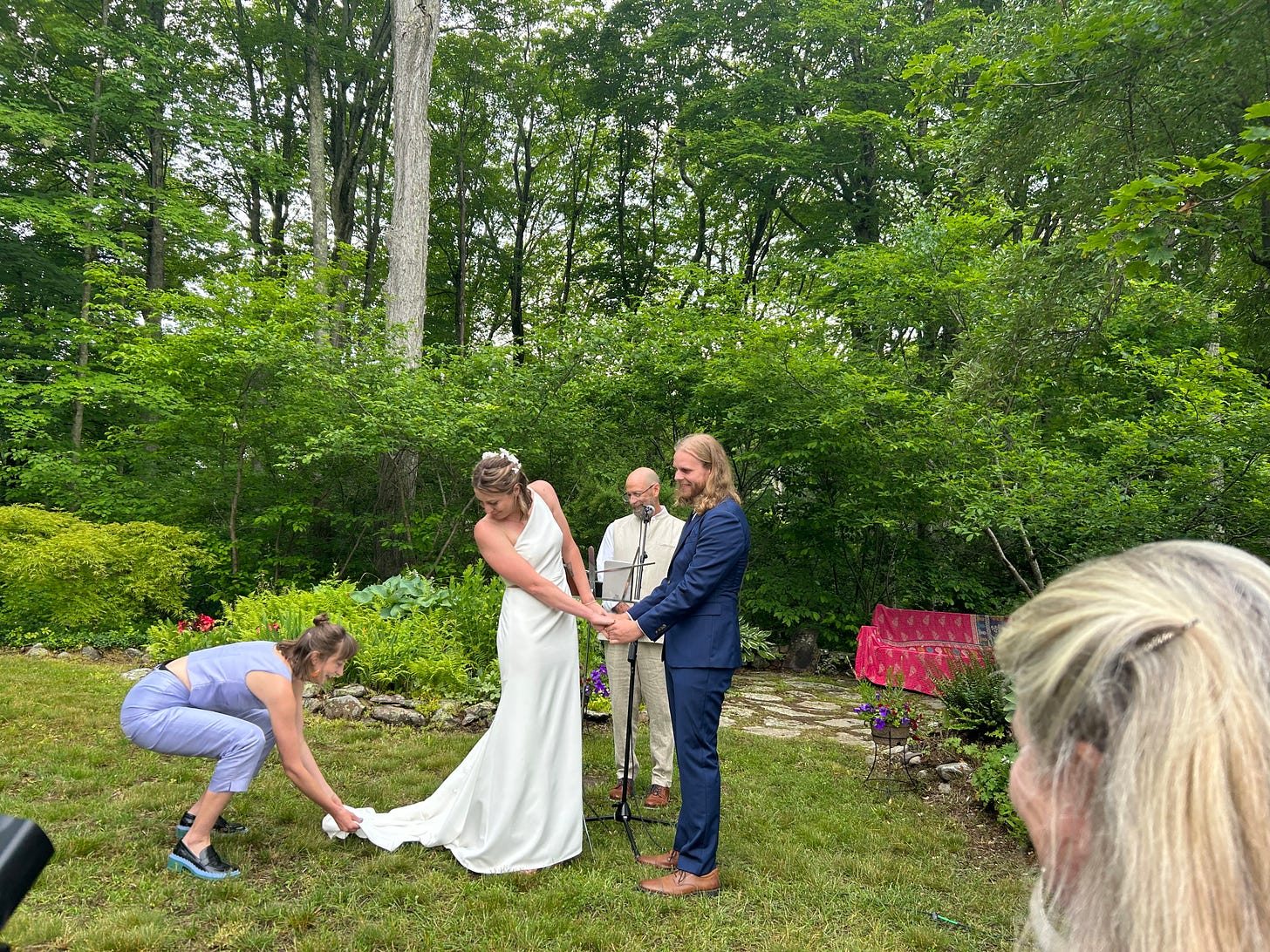










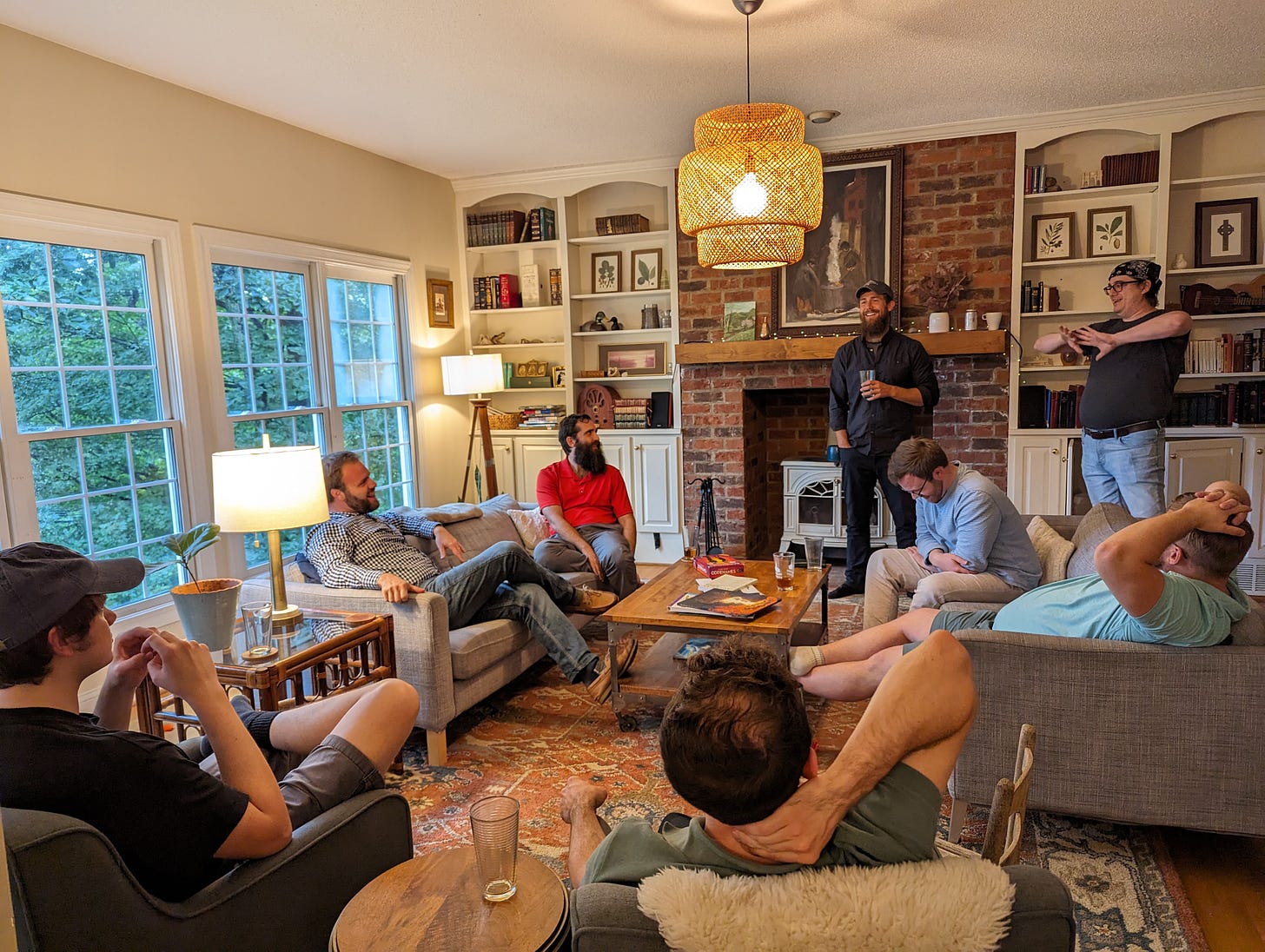
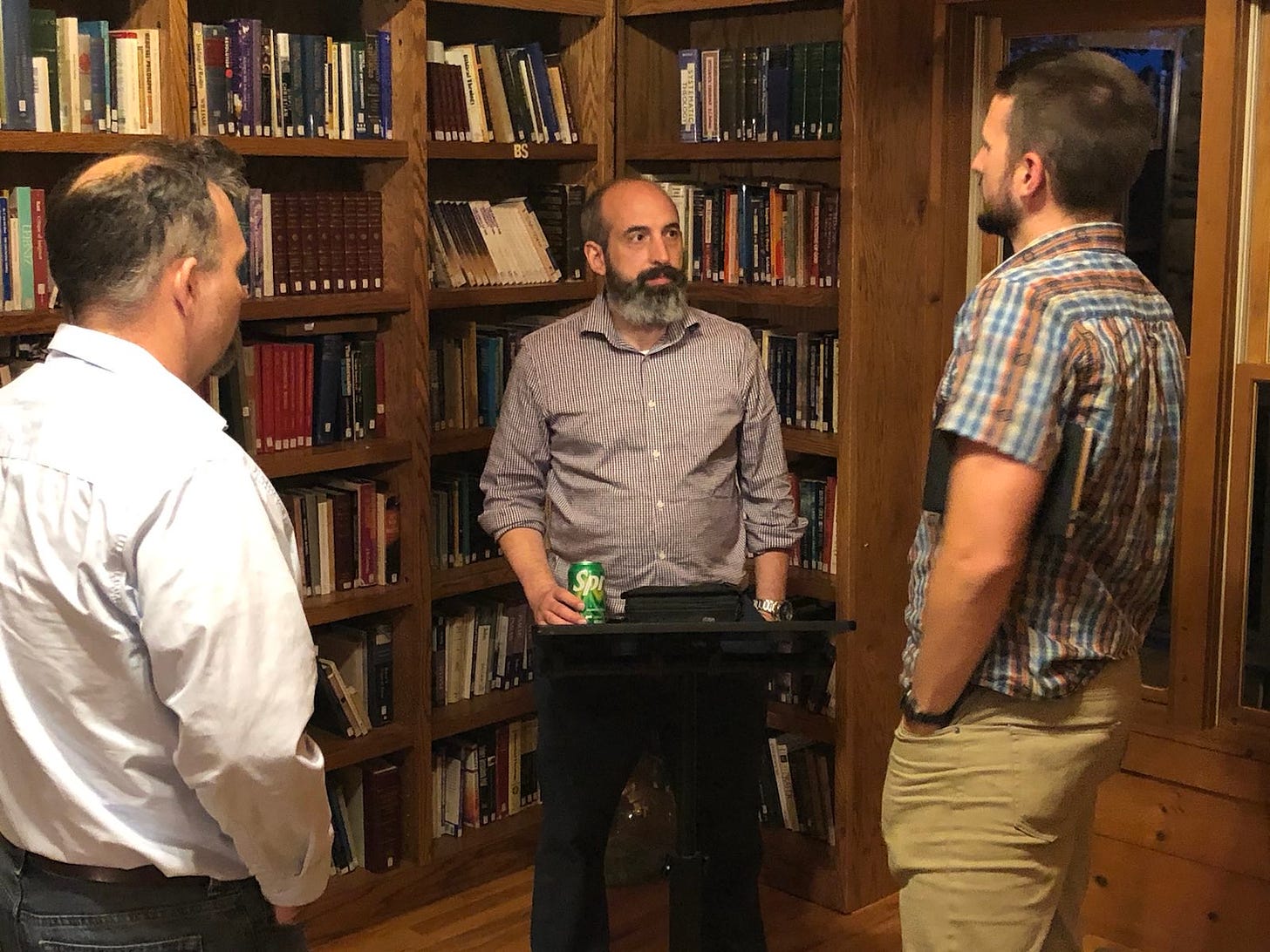

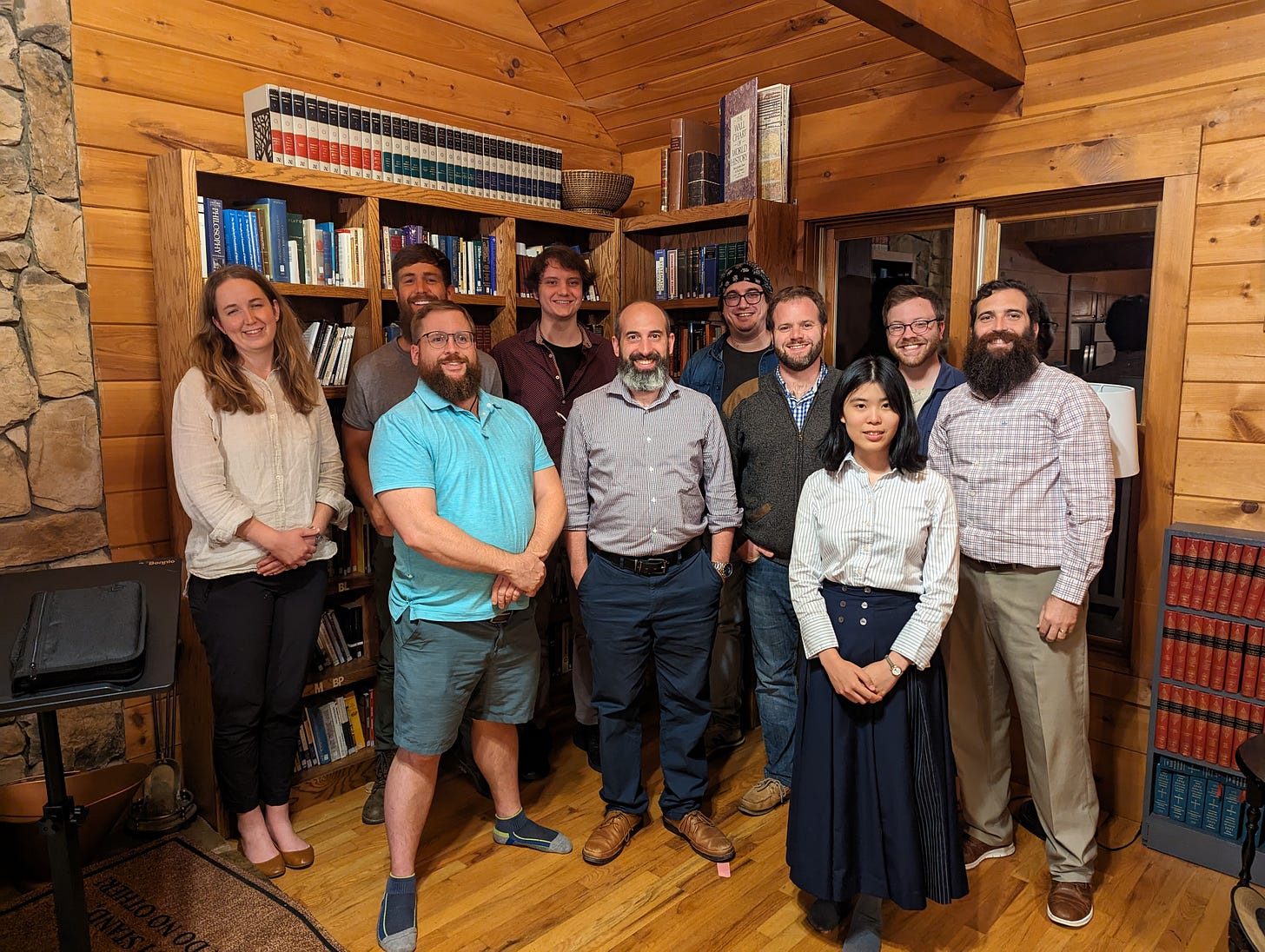
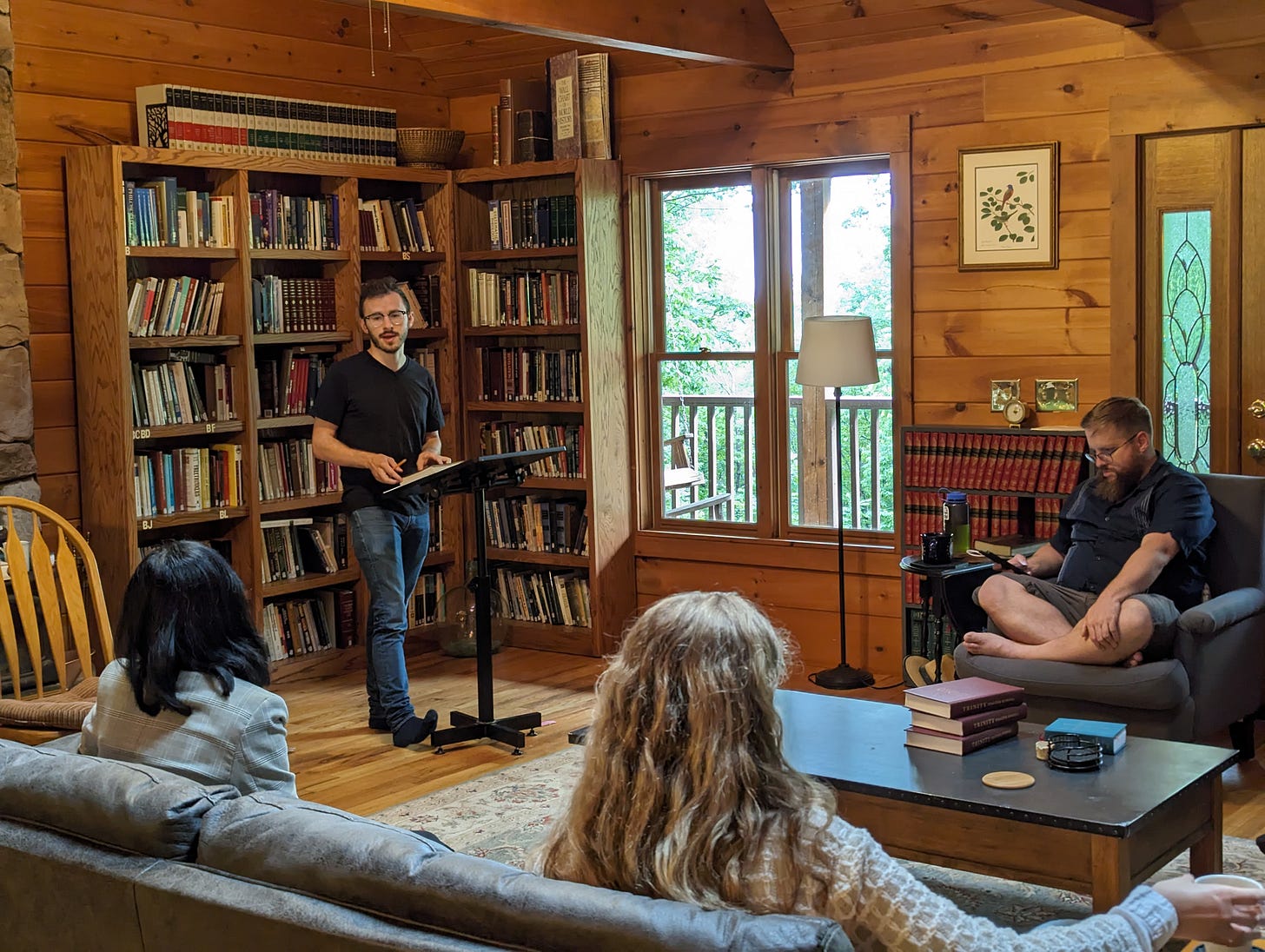











Just finished reading "Till we have faces" for the first time, alongside my high school frosh, to accompany her on a school assignment. Brilliant work; I'll be cogitating on it a while. So many jewels to mine.
"we must think from the positions within which we find ourselves, rather than imposing ill-suited ideals considered purely in the abstract upon our societies in radical moves."
I've been thinking on this a lot recently, particularly in the context of how abolition of chattel slavery took so long in Christendom. I believe the abolition was firmly taught in the fulfillment of the land laws by Christ; yet, for some reason, we were blind to it for centuries, until the great enrichment revolutionized how we think about economics. Suddenly the enslavement of our neighbor became clearly stupid and against our economic interest, something which Adam Smith argued, with some opposition. It's to our shame we didn't realize it from scripture sooner, but it's to the grace of God that he finally taught us the lesson in a seemingly perverse way... by gobsmackingly blessing the West long before we'd abolished slavery. (enough to, somewhat understandably, mislead certain operators to argue that it's slavery which made us rich). "His kindness is meant to lead you to repentance."
Those instances of radical repentance in the Kingdoms always fascinated me, e.g. the putting away of foreign wives. Its seems that radical moves are possible, but lamentably rare. Of course, the topsy-turvy thing is that going farther from the radix is the way to die... going closer to it is the way to live. “You and I have need of the strongest spell that can be found to wake us from the evil enchantment of worldliness”